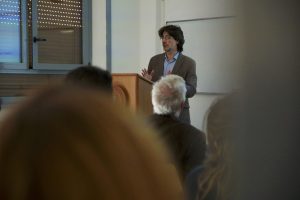Guarini Institute Hosts Panel Discussion on Italy's 2018 Election
On Friday, February 9, 2018, The Guarini Institute for Public Affairs held a panel discussion on the upcoming Italian election, which will take place on March 4th. Among the participants were students, journalists, and diplomats, as well as guests from Georgetown University and the University of Pittsburgh. The event was divided into 3 parts: JCU President Franco Pavoncello’s opening remarks, a discussion on Italy’s current electoral system, and a Q&A session. The speakers were Professor Michele Testoni from IE University in Segovia, Spain and Professor Piero Ignazi from the University of Bologna. Guarini Institute Director Professor Federigo Argentieri was the moderator of the event.
President Pavoncello suggested that the March 4th election could be the repetition of the one in 2013, where the lack of a clear winner resulted in a fragmented, less than decisive parliament. The President stated that key issues are the economic situation, EU integration, and immigration. He argued that the important questions to be asked in the aftermath of Italy’s election will be “Who is going to compromise with whom?” and “Who is going to form a coalition?”
The second part of the event was led by Professors Michele Testoni and Piero Ignazi. Professor Testoni teaches at IE University in Segovia, Spain. He explained the historical evolution of the Italian electoral system, which underwent five reforms since the Italian Republic was founded in 1946. The electoral system has historically fluctuated between a majoritarian system, where only one member of parliament is elected per constituency, and a proportional system, which reflects the overall distribution of support for each political party. The fifth and current law known as the Rosatellum was passed in November of 2017 and marks a return to a proportional system. According to Professor Testoni, under the current law a clear winner is unlikely, so he predicts that Italy will soon have a sixth law.
Professor Ignazi, Professor of Comparative Politics at the University of Bologna, presented statistics regarding Italian politics, which showed a backward tendency towards “social regression.” Professor Ignazi’s presentation illustrated Italy’s tendency to shift from modernization to backwardness, and from a pro-Europe stance to disenchantment with the EU. He claimed that these results are a consequence of people’s anger toward politicians, big corporations, and banks. The dramatic increase of non-voters is also a component of this disillusionment with politics. According to Professor Ignazi, the economy, taxation, and the banking system are the most important problems in Italy, while immigration is not.
Some of the topics examined during the Q&A session were the role of the Catholic Church in the election, possible scenarios in the aftermath, and public opinion. According to Professor Ignazi, the Church is no longer an active participant in the Italian political debate, so it can move from one side to another with ease. However, Professor Ignazi stressed that the Church is unlikely to support the Five Star Movement. He then talked about his views on a post-election scenario where the Five Star Movement will most likely be the most voted party and the Democratic Party will come in second. He also agreed with Professor Testoni’s affirmation about the need for a sixth law.
Professor Argentieri said that this is the first election ever to have been held in Italy since 1946 with no “K factor.” This term, coined by journalist Alberto Ronchey, referred to the impossibility of a normal alternation of parties in power during the post-war period in Italy. At that time, the second largest political force was the Italian communist party (PCI), and many believed that if it were to come to power, Italy’s international standing would have suffered. The Vatican was always supportive of this policy but today is unlikely to openly recommend any party or coalition.
President Pavoncello said he wasn’t sure if the future government could “afford to exclude the Five Star Movement again.” As far as the public’s perception is concerned, Professor Testoni stated that recent polls indicate that only about 25% of voters actually understand how the new electoral law works.







